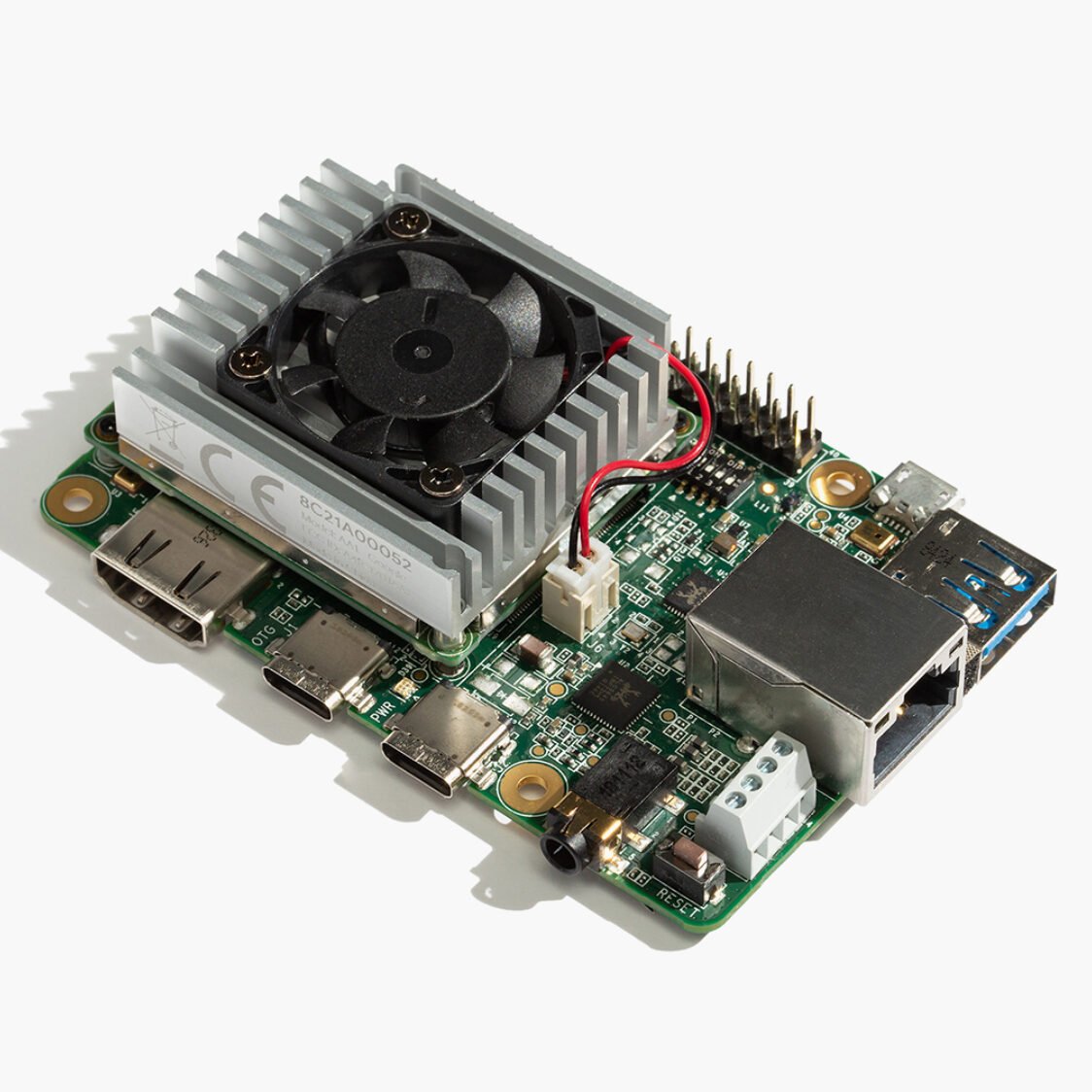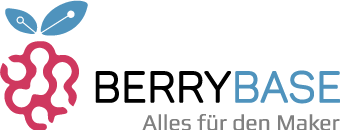Coral Dev Board 1GB / 4GB
The high-end choice of development board to support the Coral Edge TPU SoM (System on a Module)
A complete development platform for fast inferencing
The Coral Dev Board 1GB / 4GB is an ARM-based single-board computer (SBC) development board that includes a specialized Coral Edge TPU for acceleration of machine learning (ML) inferencing calculations.
The Edge TPU coprocessor is capable of 4 trillion operations per second, using only 2 Watts of power.
The special highlight of this dev board: the system includes the core components on a detachable System-on-Module (SoM). This way, you can quickly start to develop your applications on the Coral Dev Board, and once satisfied, create a hardware design around the SoM. - the SoMs can be purchased stand-alone as well, allowing you to easily integrate Machine Learning & Deep Learning applications in your use case, and scale quickly.
We also offer hardware & development services, if you would like to support your internal team.
It supports Mendel Linux (a derivative of Debian Linux).
Simply compile TensorFlow Lite models to run on the Edge TPU.
Edge TPU System-on-Module (SoM)
A big highlight of the Coral Dev Board is the System-on-Module (SoM), which contains the core parts of everything you need to build your own hardware application / custom design for Machine Learning / Deep Learning applications.
The SoM is attached to the Dev Board baseboard with three 100-pin board-to-board connectors.
This way, you can use the Coral dev board to prototype your application, and then transfer the SoM to your custom hardware to verify it. Thus you benefit from faster time-to-market, and can scale very quickly. You can also focus on your core competence - instead of investing heavily into computer engineering. We can also advise you and support you with hardware and software engineering services, should that become necessary.
In other words, this Dev Board is a prototyping and evaluation board for the Coral SoM.
This SoM includes:
- NXP i.MX 8M SoC (details see below)
- Google Edge TPU ML accelerator coprocessor (details see below)
- Cryptographic coprocessor (Microchip ATECC608A)
- Wi-Fi 2x2 MIMO (802.11b/g/n/ac 2.4/5GHz)
- Bluetooth 4.2
- 8 or 16 GB eMMC
- 4 GB LPDDR4 (also available as 1 GB version)
- Rohm BD71837MWV PMIC + 8 DC-DC buck regulators, 7 LDOs
SoC: NXP i.MX 8M SoC
- Quad-Core ARM Cortex-A53 (@1.5 GHz, 64-bit ARMv8-A) + Cortex-M4F
- Vivante GC7000Lite GPU (supports Vulkan), 32 GFLOPs 32-bit or 64 GFLOPs 16-bit
- 4Kp60 HEVC/H.265 main and main 10 decoder
- 4Kp60 VP9, 4Kp30 AVC/H.264 decoder (requires full system resources)
- 1080p/60fps MPEG-2, MPEG-4, MJPEG, H.263 decoder
ML accelerator
- Google Edge TPU coprocessor
- 4 TOPS (int8); 2 TOPS per watt
- uses PCIe and I2C/GPIO to interface with the iMX 8M SoC
The on-device ML processing reduces latency and avoids dependence on a stable network connection. It is ideal for image classification processing tasks.
Note: for optimal performance, we recommend to use this product, the Coral Development board 4GB, over the Coral Dev Board mini, This Coral Dev Board 4GB has a higher-speed interface to the Edge TPU (PCIe).
Memory
- 4 GB LPDDR4 (1600 MHz max. DDR clock)
- 8 GB or 16 GB eMMC (8-bits MMC mode)
- microSD slot, supports system boot from SD card
Interfaces & Connectivity
- Wi-Fi 2x2 MIMO (802.11a/b/g/n/ac 2.4/5GHz), Murata LBEE5U91CQ module
- Bluetooth 4.2 and BLE (Bluetooth Low Energy), Murata LBEE5U91CQ module
- 40-pin I/O header (see below)
- USB 3.0 Type-A host
- USB Type-C data (OTG capable)
- USB micro-B for serial console
- microSD slot
- Gigabit Ethernet with support for EEE (energy efficient ethernet)
- HDMI 2.0a (full size, see below)
- 3.5 mm audio jack
- 4-pin stereo terminal
- 2x Digital PDM microphone
- 39-pin FFC connector for MIPI DSI display (4-lane)
- 24-pin FFC connector for MIPI-CSI2 camera (4-lane)
- USB Type-C for power input
40-pin GPIO header:
- 3.3V power rail
- 40 - 255 Ohms programmable impedance
- ~82 mA max current
- 2x UART
- 2x SPI
- 16x GPIO lines with interrupt capability
- 4x PWM lines
(listed above are signals available to the baseboard).
Refer to this Coral.ai website for a GPIO pinout.
HDMI Display Interface:
- HDMI 2.0a (full size port), supports one display up to 1080p
- Upscale & downscale between 4K and HD video (requires full system resources)
- 20+ Audio interfaces 32-bit @ 384 kHz fs, with Time Division Multiplexing (TDM) support
- SPDIF input and output
- Audio Return Channel (ARC) on HDMI
MIPI-DSI Display Interface:
- MIPI-DSI 4 channels, supporting one display, resolution up to 1920 x 1080 @ 60 Hz
- LCDIF display controller
- output LCDIF or DC display controller output
Audio
- 2x synchronous audio interface (SAI) modules, supporting I2S, AC97, TDM and codec/DSP interfaces
- 1x SAI for 8 Tx channels for HDMI output audio
- 4-pin stereo terminal, to drive for example 4 Ohm, 3 Watt speakers
Camera
- MIPI-CSI2 camera input (4-lane), compatible with the Coral camera
Security
- Resource Domain Controller (RDC), supports four domains and up to eight regions
- Arm TrustZone (TZ) architecture
- On-Chip RAM (OCRAM) secure region protection using OCRAM controller
- High Assurance Boot (HAB)
- Cryptographic acceleration and assurance CAAM) module
- Secure non-volatile storage (SNVS): Secure real-time clock (RTC)
- Secure JTAG controller (SJC)
Misc
- boot mode DIP switches to control boot mode
- RESET button
- power LED
- 2 x serial port LEDs near serial console connector, show TX/RX activity via the serial interface
- heatsink & fan (9k RPM) for thermal management
Software compatibility
- Mendel Linux (Debian Linux derivate)
- supports TensorFlow Lite models to run on it's Edge TPU
- supports AutoML Vision Edge, for fast deployment of image classification models
Misc
- requires 5 V / 2-3 A power supply (USB Type-C connector)
The Dev Board factory setting only includes the U-Boot bootloader on the eMMC board. If required, we can pre-flash the devices for you, ask us for a quote.
Dimensions: 88.10 mm x 59.90 mm x 22.38 mm (including connectors and heatsink/fan) - see datasheet for measurements
Coral SoM dimensions: 40 mm x 48 mm x 5.11 mm (without heat sink & fan)
Ambient temperature: 0 - 50°C for reliable operation & performance.
Weight: TBD
Google part number: G950-06210-01
Asus part number: 90AN0010-B1XAY0
Google model number: TBD
Datasheet & Benchmarks
Our Coral Dev Board 4GB Resellers
Global Resellers
Germany, Austria and Switzerland
United Kingdom and Ireland
Our Coral Dev Board 1GB Resellers
Global Resellers
Germany, Austria and Switzerland
United Kingdom and Ireland
Additional Legal Information
The products offered by Google are unrelated to the products offered under the CORAL trademarks owned by Orient Development Enterprises Ltd. in Taiwan.







